 Libri di Daniel Kahneman su Unilibro.it
)
Libri di Daniel Kahneman su Unilibro.it
)
|
|
2024 |
 Title :
Decidere nell'incertezza
Title :
Decidere nell'incertezzaAuthor: Kahneman Daniel Publisher: Mondadori Ogni giorno prendiamo decisioni, e molte di queste si basano su convinzioni riguardo la probabilità di eventi incerti: il risultato di un'elezione politica, l'andamento della borsa, la colpevolezza di un imputato, il meteo della giornata. Ma che cosa determina simili convinzioni? Come fanno le persone a valutare la probabilità di un evento incerto? La ricerca neuropsicologica ha dimostrato che si affidano a un numero limitato di principi euristici, riducendo così le complesse attività di valutazione delle probabilità a operazioni di giudizio più semplici. In generale, queste euristiche sono piuttosto utili, ma talvolta possono indurre a gravi errori. Decidere nell'incertezza affronta le diverse euristiche di giudizio e i bias che producono, calandole non solo negli esperimenti dei laboratori ma anche nelle più comuni situazioni sociali, sanitarie e politiche. Tra eccessiva sicurezza, percezione del rischio e inferenze, gli autori dei trentacinque saggi qui raccolti spiegano non solo come il nostro cervello si inganna, ma anche come correggere e migliorare i nostri giudizi in condizioni di incertezza. Frutto di molti anni di studio e della revisione di numerose ricerche internazionali a opera di un consistente team di scienziati, questa raccolta, pubblicata per la prima volta nel 1974, è una pietra miliare nella storia delle neuroscienze, un libro imprescindibile che ha segnato l'inizio di quel connubio tra psicologia ed economia che è valso a Kahneman il Premio Nobel. Un campo di indagine che riguarda come nessun altro le vite quotidiane di tutti noi. € 22,00
Scontato: € 20,90
|
|
|
2023 |
 Title :
Grandi idee, grandi decisioni. Pensare più lucidamente, rilsolvere le complessità e gestire i rischi
Title :
Grandi idee, grandi decisioni. Pensare più lucidamente, rilsolvere le complessità e gestire i rischiAuthor: Kahneman Daniel Publisher: ROI edizioni Quali sono i rischi e gli errori maggiori insiti nei ragionamenti con cui prendiamo le decisioni importanti e come possiamo evitarli? In Grandi idee, grandi decisioni (un'inedita raccolta di tre articoli scritti nell'arco di quasi vent'anni) Daniel Kahneman, premio Nobel per l'economia e psicologo fra i più importanti del secolo, esplora alcuni temi fondamentali del processo di decision making: dai bias che influiscono sulle valutazioni dei nostri progetti, facendoci essere poco obiettivi e molto ottimisti, alla cultura aziendale delle grandi corporation che rende i manager molto poco propensi a investire prendendosi rischi (necessari per avere un ritorno economico significativo), sino alle storture con cui deleghiamo le decisioni a team assemblati per dare conferma alle nostre idee preconcette. E ci fornisce preziosi strumenti, come una utilissima checklist di domande da porsi e da porre prima di avviare un progetto, per pensare in modo più razionale e prendere decisioni migliori. Prefazione di Paolo Legrenzi. € 14,90
Scontato: € 14,16
|
 Title :
Rumore. Un difetto del ragionamento umano
Title :
Rumore. Un difetto del ragionamento umanoAuthor: Kahneman Daniel; Sibony Olivier; Sunstein Cass R. Publisher: UTET Dove c'è una decisione, un giudizio, una previsione, lì si trova il rumore. Due medici che danno due diagnosi diverse allo stesso paziente sulla base degli stessi esami. O due giudici che assegnano pene diverse a colpevoli dello stesso reato. O, addirittura, lo stesso manager che prende una decisione diversa a seconda del momento della giornata. Non dovrebbe accadere, ma accade. A tutti è capitato di trovarsi in situazioni in cui la realtà è ben diversa dalla teoria e decisioni che dovrebbero essere guidate da criteri oggettivi sembrano, invece, casuali. E la colpa è del rumore. Daniel Kahneman, premio Nobel per l'Economia e autore del bestseller mondiale 'Pensieri lenti e veloci', ha studiato per anni con Olivier Sibony e Cass R. Sunstein questo difetto del funzionamento mentale e in questo libro dimostra come ovunque si eserciti il giudizio umano - nella sanità pubblica come nelle aule di giustizia, nelle strategie aziendali come nelle decisioni quotidiane di tutti noi - lì si trovi il rumore, a sviare il ragionamento e causare errori. Una ricerca accurata, un libro ricchissimo di idee che svela un fenomeno onnipresente ma finora largamente ignorato e consente ai suoi lettori di riconoscere e controllare l'influenza che il rumore esercita su tutte le loro decisioni, previsioni e valutazioni. € 18,50
Scontato: € 17,58
|
|
2021 |
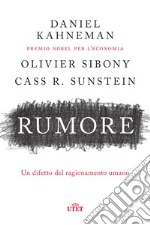 Title :
Rumore. Un difetto del ragionamento umano
Title :
Rumore. Un difetto del ragionamento umanoAuthor: Kahneman Daniel; Sibony Olivier; Sunstein Cass R. Publisher: UTET Due medici che danno due diagnosi diverse allo stesso paziente sulla base degli stessi esami. O due giudici che assegnano pene diverse a colpevoli dello stesso reato. O, addirittura, lo stesso manager che prende una decisione diversa a seconda del momento della giornata. Non dovrebbe accadere, invece l'esperienza insegna che sono decine gli ambiti in cui le decisioni dovrebbero essere dettate da criteri oggettivi, ma in cui alla fine la realtà è ben diversa dalla teoria. E la colpa è del rumore. Daniel Kahneman, premio Nobel per l'economia e autore del bestseller mondiale 'Pensieri lenti, pensieri veloci', ha studiato per anni con Olivier Sibony e Cass R. Sunstein questo difetto del funzionamento mentale e in questo libro dimostra come ovunque si eserciti il giudizio umano - nella sanità pubblica come nelle aule di giustizia, nei processi aziendali come nelle decisioni quotidiane di tutti noi - lì si trovi il rumore, a sviare il ragionamento e causare errori. Una ricerca accurata, un libro ricco di idee che svela un fenomeno onnipresente ma finora largamente ignorato e consente ai suoi lettori di riconoscere e controllare l'influenza che il rumore esercita su tutte le loro decisioni, previsioni e valutazioni. € 24,00
Scontato: € 22,80
|
|
|
2020 |
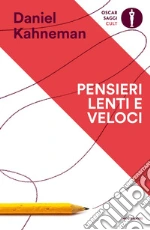 Title :
Pensieri lenti e veloci
Title :
Pensieri lenti e velociAuthor: Kahneman Daniel Publisher: Mondadori Siamo stati abituati a ritenere che all'uomo, in quanto essere dotato di razionalità, sia sufficiente tenere a freno l'istinto e l'emotività per essere in grado di valutare in modo obiettivo le situazioni che deve affrontare e di scegliere, tra varie alternative, quella per sé più vantaggiosa. Gli studi sul processo decisionale condotti ormai da molti anni dal premio Nobel Daniel Kahneman hanno mostrato quanto illusoria sia questa convinzione e come, in realtà, siamo sempre esposti a condizionamenti - magari da parte del nostro stesso modo di pensare - che possono insidiare la capacità di giudicare e di agire lucidamente. Illustrando gli ultimi risultati della sua ricerca, Kahneman ci guida in un'esplorazione della mente umana e ci spiega come essa sia caratterizzata da due processi di pensiero ben distinti: uno veloce e intuitivo (sistema 1), e uno più lento ma anche più logico e riflessivo (sistema 2). Se il primo presiede all'attività cognitiva automatica e involontaria, il secondo entra in azione quando dobbiamo svolgere compiti che richiedono concentrazione e autocontrollo. Efficiente e produttiva, questa organizzazione del pensiero ci consente di sviluppare raffinate competenze e abilità e di eseguire con relativa facilità operazioni complesse. Ma può anche essere fonte di errori sistematici (bias), quando l'intuizione si lascia suggestionare dagli stereotipi e la riflessione è troppo pigra per correggerla. € 19,00
Scontato: € 18,05
|
|
|
1918 |
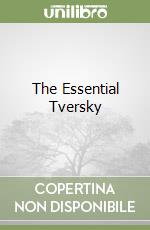 Title :
The Essential Tversky
Title :
The Essential TverskyAuthor: Tversky Amos, Shafir Eldar (EDT), Lewis Michael (FRW), Kahneman Daniel (AFT) Publisher: Mit Pr € 37,20
|
|
|
1917 |
 Title :
HBR's 10 Must Reads 2018
Title :
HBR's 10 Must Reads 2018Author: Harvard Business Review, Porter Michael E., Kaplan Robert S., Kahneman Daniel, Martin Roger L. Publisher: Harvard Business School Pr € 42,50
|
 Title :
Schnelles Denken, Langsames De
Title :
Schnelles Denken, Langsames DeAuthor: KAHNEMAN DANIEL Publisher: Random Germania SCHNELLES DENKEN, LANGSAMES DE - KAHNEMAN DANIEL - Random Germania € 15,60
|
|
1916 |
 Title :
HBR's 10 Must Reads on Making Smart Decisions (CD Audiobook)
Title :
HBR's 10 Must Reads on Making Smart Decisions (CD Audiobook)Author: Harvard Business Review (COR), Kahneman Daniel, Lovallo Dan, Sibony Olivier (NRT), Thomas James Edward (NRT) Publisher: Audible Studios on Brilliance audio € 23,10
|
|
|
1915 |
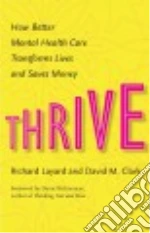 Title :
Thrive
Title :
ThriveAuthor: Layard Richard, Clark David M., Kahneman Daniel (FRW) Publisher: Princeton Univ Pr Mental illness is a leading cause of suffering in the modern world. In sheer numbers, it afflicts at least 20 percent of people in developed countries. It reduces life expectancy as much as smoking does, accounts for nearly half of all disability claims, is behind half of all worker sick days, and affects educational achievement and income. There are effective tools for alleviating mental illness, but most sufferers remain untreated or undertreated. What should be done to change this? InThrive, Richard Layard and David Clark argue for fresh policy approaches to how we think about and deal with mental illness, and they explore effective solutions to its miseries and injustices. Layard and Clark show that modern psychological therapies are highly effective and could potentially turn around the lives of millions of people at little or no cost. This is because treating psychological problems generates huge savings on physical health care, as well as massive economic savings through more people working. So psychological therapies would effectively pay for themselves, generating potential savings for nations the world over. Layard and Clark describe how various successful psychological treatments have been developed and explain what works best for whom. They also discuss how mental illness can be prevented through better schools and a better society, and the urgency of doing so. Illustrating why we cannot afford to ignore the issue of mental illness, Thriveopens the door to new options and possibilities for one of the most serious problems facing us today. € 26,80
|
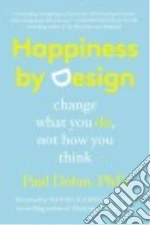 Title :
Happiness by Design
Title :
Happiness by DesignAuthor: Dolan Paul Ph.D., Kahneman Daniel Ph.D. (FRW) Publisher: Plume Bold and original.” Daniel Kahneman, PhD, bestselling author of Thinking Fast and Slow There are a slew of books on the market dictating programs for achieving happiness, butHappiness by Design is the first to explain that happiness ultimately depends upon our experience of pleasure and purpose over timeand everyone has their own optimal balance. Combining the latest insights from economics and psychology, renowned behavior expert Paul Dolan, PhD, shows readers how to integrate his groundbreaking paradigm into a practical plan for deciding, designing, and doing the things that bring them true happiness. € 14,80
|
|
1914 |
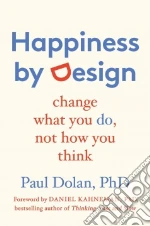 Title :
Happiness by Design
Title :
Happiness by DesignAuthor: Dolan Paul Ph.D., Kahneman Daniel Ph.D. (FRW) Publisher: Penguin Group USA This is not just another happiness book. In Happiness by Design, happiness and behavior expert Paul Dolan combines the latest insights from economics and psychology to illustrate that in order to be happy we must behave happy Our happiness is experiences of both pleasure and purpose over time and it depends on what we actually pay attention to. Using what Dolan calls deciding, designing, and doing, we can overcome the biases that make us miserable and redesign our environments to make it easier to experience happiness, fulfilment, and even health. With uncanny wit and keen perception, Dolan reveals what we can do to find our unique optimal balance of pleasure and purpose, offering practical advice on how to organize our lives in happiness-promoting ways and fresh insights into how we feel, including why: ? Having kids reduces pleasure but gives us a massive dose of purpose ? Gaining weight won’t necessarily make us unhappier, but being too ambitious might ? A quiet neighborhood is more important than a big house Vividly rendering intriguing research and lively anecdotal evidence, Happiness by Design offers an absorbing, thought-provoking, new paradigm for readers of Stumbling on Happiness and The How of Happiness. € 21,80
|
|
|
1913 |
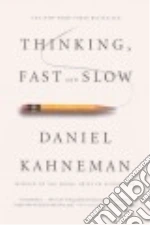 Title :
Thinking, Fast and Slow
Title :
Thinking, Fast and SlowAuthor: Kahneman Daniel Publisher: Turtleback Books € 36,00
|
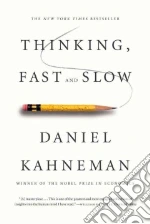 Title :
Thinking, Fast and Slow
Title :
Thinking, Fast and SlowAuthor: Kahneman Daniel Publisher: Farrar Straus & Giroux Selected by the New York Times Book Review as one of the best books of 2011 A Globe and Mail Best Books of the Year 2011 Title One of The Economist’s 2011 Books of the Year One of The Wall Steet Journal's Best Nonfiction Books of the Year 2011 Winner of the 2011 Los Angeles Times Book Prize for Current Interest Daniel Kahneman, recipient of the Nobel Prize in Economic Sciences for his seminal work in psychology that challenged the rational model of judgment and decision making, is one of our most important thinkers. His ideas have had a profound and widely regarded impact on many fields—including economics, medicine, and politics—but until now, he has never brought together his many years of research and thinking in one book. In the highly anticipated Thinking, Fast and Slow, Kahneman takes us on a groundbreaking tour of the mind and explains the two systems that drive the way we think. System 1 is fast, intuitive, and emotional; System 2 is slower, more deliberative, and more logical. Kahneman exposes the extraordinary capabilities—and also the faults and biases—of fast thinking, and reveals the pervasive influence of intuitive impressions on our thoughts and behavior. The impact of loss aversion and overconfidence on corporate strategies, the difficulties of predicting what will make us happy in the future, the challenges of properly framing risks at work and at home, the profound effect of cognitive biases on everything from playing the stock market to planning the next vacation—each of these can be understood only by knowing how the two systems work together to shape our judgments and decisions. Engaging the reader in a lively conversation about how we think, Kahneman reveals where we can and cannot trust our intuitions and how we can tap into the benefits of slow thinking. He offers practical and enlightening insights into how choices are made in both our business and our personal lives—and how we can use different techniques to guard against the mental glitches that often get us into trouble. Thinking, Fast and Slow will transform the way you think about thinking. € 16,10
|
|
1912 |
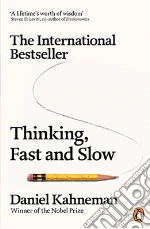 Title :
Thinking, Fast and Slow
Title :
Thinking, Fast and SlowAuthor: Daniel Kahneman Publisher: PENGUIN GROUP € 19,85
Scontato: € 18,86
|
|
|
2012 |
 Title :
Critica della ragione economica
Title :
Critica della ragione economicaAuthor: McFadden Daniel; Smith Vernon L.; Kahneman Daniel; Motterlini M. (cur.); Piattelli Palmarini M. (cur.) Publisher: Il Saggiatore Il volume affronta la questione della razionalità umana da un punto di vista interdisciplinare. Offre una critica circostanziata della nozione di 'razionalità economica', a partire dai risultati empirici della psicologia cognitiva e dell'economia sperimentale. Gli autori sostengono dunque la necessità di sviluppare una teoria economica empiricamente fondata, basata su una più realistica teoria della cognizione umana. Un'ipotesi di superamento della teoria economica neoclassica, che poggia su ipotesi accettate ma mai verificate a livello empirico. € 13,00
Scontato: € 12,35
|
 Title :
Pensieri lenti e veloci
Title :
Pensieri lenti e velociAuthor: Kahneman Daniel Publisher: Mondadori Siamo stati abituati a ritenere che all'uomo, in quanto essere dotato di razionalità, sia sufficiente tenere a freno l'istinto e l'emotività per essere in grado di valutare in modo obiettivo le situazioni che deve affrontare e di scegliere, tra varie alternative, quella per sé più vantaggiosa. Gli studi sul processo decisionale condotti ormai da molti anni dal premio Nobel Daniel Kahneman hanno mostrato quanto illusoria sia questa convinzione e come, in realtà, siamo sempre esposti a condizionamenti - magari da parte del nostro stesso modo di pensare - che possono insidiare la capacità di giudicare e di agire lucidamente. Illustrando gli ultimi risultati della sua ricerca, Kahneman ci guida in un'esplorazione della mente umana e ci spiega come essa sia caratterizzata da due processi di pensiero ben distinti: uno veloce e intuitivo (sistema 1), e uno più lento ma anche più logico e riflessivo (sistema 2). Se il primo presiede all'attività cognitiva automatica e involontaria, il secondo entra in azione quando dobbiamo svolgere compiti che richiedono concentrazione e autocontrollo. Efficiente e produttiva, questa organizzazione del pensiero ci consente di sviluppare raffinate competenze e abilità e di eseguire con relativa facilità operazioni complesse. Ma può anche essere fonte di errori sistematici (bias), quando l'intuizione si lascia suggestionare dagli stereotipi e la riflessione è troppo pigra per correggerla. € 22,00
|
|
1911 |
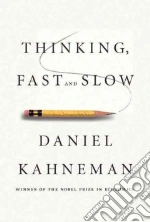 Title :
Thinking, Fast and Slow
Title :
Thinking, Fast and SlowAuthor: Kahneman Daniel Publisher: Farrar Straus & Giroux A Nobel Prize-winning psychologist draws on years of research to introduce his 'machinery of the mind' model on human decision making to reveal the faults and capabilities of intuitive versus logical thinking, providing insights into such topics as optimism, the unpredictability of happiness and the psychological pitfalls of risk-taking --- Daniel Kahneman, recipient of the Nobel Prize in Economic Sciences for his seminal work in psychology that challenged the rational model of judgment and decision making, is one of our most important thinkers. His ideas have had a profound and widely regarded impact on many fields—including economics, medicine, and politics—but until now, he has never brought together his many years of research and thinking in one book. In the highly anticipated Thinking, Fast and Slow, Kahneman takes us on a groundbreaking tour of the mind and explains the two systems that drive the way we think. System 1 is fast, intuitive, and emotional; System 2 is slower, more deliberative, and more logical. Kahneman exposes the extraordinary capabilities—and also the faults and biases—of fast thinking, and reveals the pervasive influence of intuitive impressions on our thoughts and behavior. The impact of loss aversion and overconfidence on corporate strategies, the difficulties of predicting what will make us happy in the future, the challenges of properly framing risks at work and at home, the profound effect of cognitive biases on everything from playing the stock market to planning the next vacation—each of these can be understood only by knowing how the two systems work together to shape our judgments and decisions. Engaging the reader in a lively conversation about how we think, Kahneman reveals where we can and cannot trust our intuitions and how we can tap into the benefits of slow thinking. He offers practical and enlightening insights into how choices are made in both our business and our personal lives—and how we can use different techniques to guard against the mental glitches that often get us into trouble. Thinking, Fast and Slow will transform the way you think about thinking. € 26,80
|
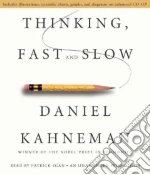 Title :
Thinking, Fast and Slow (CD Audiobook)
Title :
Thinking, Fast and Slow (CD Audiobook)Author: Kahneman Daniel, Egan Patrick (NRT) Publisher: Random House The guru to the gurus at last shares his knowledge with the rest of us. Nobel laureate Daniel Kahneman's seminal studies in behavioral psychology, behavioral economics, and happiness studies have influenced numerous other authors, including Steven Pinker and Malcolm Gladwell. In Thinking, Fast and Slow, Kahneman at last offers his own, first book for the general public. It is a lucid and enlightening summary of his life's work. It will change the way you think about thinking. Two systems drive the way we think and make choices, Kahneman explains: System One is fast, intuitive, and emotional; System Two is slower, more deliberative, and more logical. Examining how both systems function within the mind, Kahneman exposes the extraordinary capabilities as well as the biases of fast thinking and the pervasive influence of intuitive impressions on our thoughts and our choices. Engaging the reader in a lively conversation about how we think, he shows where we can trust our intuitions and how we can tap into the benefits of slow thinking, contrasting the two-system view of the mind with the standard model of the rational economic agent. Kahneman's singularly influential work has transformed cognitive psychology and launched the new fields of behavioral economics and happiness studies. In this path-breaking book, Kahneman shows how the mind works, and offers practical and enlightening insights into how choices are made in both our business and personal lives--and how we can guard against the mental glitches that often get us into trouble. From the Hardcover edition. € 44,60
|
|
2007 |
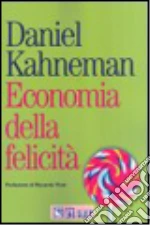 Title :
Economia della felicità
Title :
Economia della felicitàAuthor: Kahneman Daniel Publisher: Il Sole 24 Ore € 14,00
|
|
|
2003 |
 Title :
Well-Being
Title :
Well-BeingAuthor: Kahneman Daniel (EDT), Diener Ed (EDT), Schwarz Norbert (EDT) Publisher: Russell Sage Foundation The nature of well-being is one of the most enduring and elusive subjects of human inquiry. Well-Being draws upon the latest scientific research to transform our understanding of this ancient question. With contributions from leading authorities in psychology, social psychology, and neuroscience, this volume presents the definitive account of current scientific efforts to understand human pleasure and pain, contentment and despair. The distinguished contributors to this volume combine a rigorous analysis of human sensations, emotions, and moods with a broad assessment of the many factors, from heredity to nationality, that bear on our well-being. Using the tools of experimental science, the contributors confront the puzzles of human likes and dislikes. Why do we grow accustomed and desensitized to changes in our lives, both good and bad? Does our happiness reflect the circumstances of our lives or is it determined by our temperament and personality? Why do humans acquire tastes for sensations that are initially painful or unpleasant? By examining the roots of our everyday likes and dislikes, the book also sheds light on some of the more extreme examples of attraction and aversion, such as addiction and depression. Among its wide ranging inquiries, Well-Being examines systematic differences in moods and behaviors between genders, explaining why women suffer higher rates of depression and anxiety than men, but are also more inclined to express positive emotions. The book also makes international comparisons, finding that some countries' populations report higher levels of happiness than others. The contributors deploy an array of methods, from the surveys and questionnaires of social science to psychological and physiological experiments, to develop a comprehensive new approach to the study of well-being. They show how the sensory pleasures of the body can tells us something about the higher pleasures of the mind and even how the effectiveness of our immune system can depend upon the health of our social relationships. € 63,80
|
|
|
2002 |
 Title :
Heuristics and Biases
Title :
Heuristics and BiasesAuthor: Gilovich Thomas (EDT), Griffin Dale W. (EDT), Kahneman Daniel (EDT) Publisher: Cambridge Univ Pr An anthology of new and existing contributions in which psychologists from around the world examine how people decide whether a benefit is worth the cost, whether someone would make a good parent, whether the left flank is adequately protected, and other fuzzy questions. They explain that judgment under uncertainty is often based not on formal and extensive algorithmic processing, but on a limited number of simplifying heuristics that typically yield accurate judgments but can also generate systematic error. Annotation c. Book News, Inc., Portland, OR (booknews.com) € 51,50
|
|
|
2000 |
 Title :
Choices, Values and Frames
Title :
Choices, Values and FramesAuthor: Kahneman Daniel (EDT), Tversky Amos (EDT) Publisher: Cambridge Univ Pr Choices, Values, and Frames presents an empirical and theoretical challenge to classical utility theory, offering prospect theory as an alternative framework. Extensions and applications to diverse economic phenomena and to studies of consumer behavior are discussed. The book also elaborates on framing effects and other demonstrations that preferences are constructed in context, and it develops new approaches to the standard view of choice-based utility. As with the classic 1982 volume, Judgment Under Uncertainty, this volume is comprised of papers published in diverse academic journals. The editors have written several new chapters and a preface to provide a context for the work. € 87,10
|